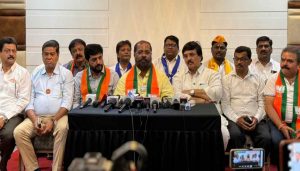India needs to produce 120 million tons Rice by 2030 : CII
Confederation of Indian Industry (CII) jointly with International Rice Research Institute (IRRI) and International Food Policy Research Institute (IFPRI) organised an exclusive technology, strategy and policy oriented Conference on Rice: Emerging Trends & Future Prospects on 27th March, 2017 in Pune.
With the presence of Policy Makers, Senior Central and State Government Officials, Industry Leaders and other Stake holders, the conference was flagged off by welcome speech and theme presentation by Mr V Shankar, Conference Chairman and Managing Director and CEO, Rallis Indian Limited. Mr Shankar pointed out that “Rice is the most important food crop of the developing world and the staple food for more than 60 per cent of the Indian populace. Although an all-time high production of 106.65 million tons of rice with a productivity of 2.39 tons per hectare was achieved during the year 2013-14, India needs to produce 120 million tons by 2030 to feed its one and a half billion plus population by then using less land, less water, less manpower and optimising all agri input usages. Besides adopting cutting edge science and technology for increasing rice productivity, in India, for the sustainable rice cultivation, procurement and marketing, policy makers and stakeholders have to address issues related to quality seeds, crop protection, sustainable use of quality agri inputs, cost of production, price, procurement, regulatory aspects, fragmented land, forward and backward linkages, infrastructure, logistics, market and import-export policy related to rice”.
Eminent Agri Policy expert Prof Vijay Paul Sharma, Chairman, Commission for Agricultural Costs and Prices (CACP), Government of India in his inaugural address elaborated all aspects of rice value chain. Prof Sharma highlighted the emerging trends and future prospects of rice in India. He suggested “in order to address the pressing issues in the rice value chain we have to strengthen the 4 pillars – Technology, Institutional support, Infrastructure and Incentives. All the 4 pillars are important and there should be synergy amongst them. He pointed out that private sector can play an important role in bridging the yield gaps in collaboration with Government and research institutions. Agriculture extension play a key role in bridging lab to farm technology dissemination. The good news is, this year, India is going to produce around 107 tonnes of rice which is a plus point” he added.
Mr Shyam Khadka, FAO Representative in India, in his Key Note address, highlighted the adverse impact of the climate change on rice production and diversified rice yields in India. Mr Khadka suggested that “technology has to be customised and not standardised for all problems. The other issues which has to be paid due attention are: socio-economic factors, nutrient deficiency, obesity, environment issues and sustainability”.
Mr Ashwin Malhotra, Chairman – CII Western Region Task Force on Backward and Forward Linkage in Agriculture and Managing Director, Weikflied Food Pvt Ltd. in his closing address emphasised the importance of agri extension and awareness creation amongst the farmers through proper skill development and capacity building. Mr Malhotra pointed out that CII is enabling farmers in this aspect through Seminars, Workshops, Agri Melas / Exhibitions and skill development projects.






